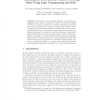Free Online Productivity Tools
i2Speak
i2Symbol
i2OCR
iTex2Img
iWeb2Print
iWeb2Shot
i2Type
iPdf2Split
iPdf2Merge
i2Bopomofo
i2Arabic
i2Style
i2Image
i2PDF
iLatex2Rtf
Sci2ools
124
click to vote
CHARME
2003
Springer
2003
Springer
Analyzing the Intel Itanium Memory Ordering Rules Using Logic Programming and SAT
We present a non-operational approach to specifying and analyzing shared memory consistency models. The method uses higher order logic to capture a complete set of ordering constraints on execution traces, in an axiomatic style. A direct encoding of the semantics with a constraint logic programming language provides an interactive and incremental framework for exercising and verifying finite test programs. The framework has also been adapted to generate equivalent boolean satisfiability (SAT) problems. These techniques make a memory model specification executable, a powerful feature lacked in most non-operational methods. As an example, we provide a concise formalization of the Intel Itanium memory model and show how constraint solving and SAT solving can be effectively applied for computer aided analysis. Encouraging initial results demonstrate the scalability for complex industrial designs.
| Added | 06 Jul 2010 |
| Updated | 06 Jul 2010 |
| Type | Conference |
| Year | 2003 |
| Where | CHARME |
| Authors | Yue Yang, Ganesh Gopalakrishnan, Gary Lindstrom, Konrad Slind |
Comments (0)

